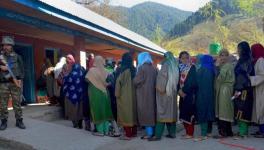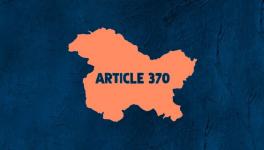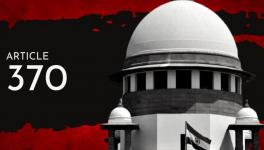Domicile Law for Kashmir Reinforces Fears of 'Demographic Changes’ Despite Amends
Srinagar: Days after a new domicile law was introduced for the Union territory of Jammu and Kashmir (J&K), the government amended the law late Friday reserving rights over all jobs for redefined domiciles of the region.
As significant as it appeared, the decision failed to invoke any fervour among people in the region, who consider the problem more deep-rooted than what could be addressed by the changes made in the new law.
Nearly eight months after the government of India abrogated Article 370 and downsized the erstwhile state of J&K into two Union territories, a state gazette notification on March 31, introduced the domicile law that reserved only low-level government jobs exclusively for residents of the region while the higher level jobs were open to everyone. With the amendment, all jobs are now reserved for J&K residents but, not limited to the residents that are original "state subjects" of the region.
The decision redefined the domiciles of the region and included those who have resided in J&K for a period of 15 years, and children of all Central government employees who have served here for a period of 10 years or have appeared in the Class 10 or the Class 12 examinations. All of these will now be eligible for domicile certificates. Under the notification, the domicile certificates are to be provided by a Tehsildar - a Tehsil level revenue official.
Earlier, under the safeguards of Article 35 A, which was abrogated with Article 370, all jobs were reserved for residents of J&K defined by state-subject rules enacted in 1927 during the erstwhile Dogra rule.
The law was a result of an agitation led by Kashmiri Hindus against the Dogras, Hindus from Jammu, as a means to secure their share in government services. At that time, all those who were born and lived in the region before the Dogra reign began and those who had acquired immovable property, were defined as state subjects.
These rules continued in the region under the "special status" negotitated by J&K’s first Prime Minister, Sheikh Abdullah, with New Delhi after the Dogras signed an instrument of accession until the Bharatiya Janata Party (BJP)-led Central government struck the entire "safeguards" down on August 5 last year.
In Kashmir, the opposition to change the state-subject law is not just seen within the prism of only jobs and security. People in the region have long suspected the intentions of the Indian government to make attempts to "change the demography of the region", the only Muslim majority state in the country.
This suspicion among the people of J&K has been voiced by many, especially the separatist groups, who fanned this insecurity. It was widely felt that any alteration in demographic changes would affect the solution to the larger political issue of Kashmir through a proposed plebiscite or referendum, which was reserved only for original subjects of undivided J&K.
Even as many believe that the final stamp on disempowerment of the region was put on August 5, many others say the new domicile law only reinforces the fear of "manipulation" and is another step towards a possible "demographic change".
Political analyst Noor Mohammad Baba, who taught political science at the University of Kashmir, says there are immediate as well as long-term repercussions of the decision on domiciles. "People in Jammu as well as Kashmir regions have their own issues with the change in domicile law. The former are apprehensive of the immediate fallout, while the latter are apprehensive of long-term fallout of this law," he says.
Baba explains that the immediate fallout is related to election promises, jobs and identity politics in the Jammu division. For Kashmiris, he points out, the issues are more complex and layered and so are the implications.
"People are (in Kashmir) more apprehensive about demographic changes, which they think can put the political process and the identity of region at risk," Baba says.
Syed Ali Shah Geelani-led Hurriyat, in its statement, referred to the decision as a "calculated move" which they had been warning about for years. "This is a calculated move to bring the law into force and define the domicile so as to outnumber the residents of the state of Jammu and Kashmir in coming years," the statement read.
This opinion, held by separatist parties so far, is now also being reflected upon by mainstream political parties, such as the National Conference (NC).
In a statement on Saturday, NC said, "the amendments to domicile law is another example of central governments toying around with J&K and its people, and a move bereft of any guarantee against demographic changes here."
A Kashmiri history scholar also believes that the root of the domicile decision lies in "settler colonialism," citing the example of the Palestine issue.
"In Palestine, many people had already bought land in the first half of the 20th century. Here, that has not been the case, but this policy might overwhelm Kashmir very quickly as people are already in deep distress on multiple fronts," the scholar says, wishing anonymity.
Meanwhile, the J&K Police has warned of legal action against those "instigating" others against the domicile law. Despite that, all major political parties, including the Right-wing parties in Jammu division, have opposed the new domicile law.
Ahead of the abrogation of Article 370, hundreds of politicians, lawyers, activists, businessmen and trade leaders were arrested as "preventive measures" to contain any protest or opposition to the revocation of J&K’s "special status". As most detained mainstream politicians claimed they would continue to work for bringing back the pre-August position, in March, a new political party was floated in Srinagar, which constituted second and third-rung leaders from all existing parties, who by now had reconciled with the downgraded status of J&K.
The new J&K Apni Party president AltafBukharisaid he was confident about a new domicile law that would safeguard the people's right over jobs and land. Many Kashmiris in the government services had also pinned their hopes on Bukhari.
The newly formed party, however, has also rubbished the new law as an ‘ill-timed and causal attempt’ by the government of India.
Baba says the domicile law will not change the position created on August 5. "Many people, especially politicians, were at least hopeful about safeguard of interests but, it seems they are all disappointed," he says.
The "disappointment" due to the domicile law seems to have invoked renewed concerns in the entire region.
Mohammad Ibrahim Wani, who teaches at University of Kashmir's Institute of Kashmir Studies (IKS), says the "domicile substitutions for permanent resident definitions have to be read alongside two upcoming exercises -- the process of delimitation and the Census.
"The changes in voter rolls are intentioned to put further pressure on mainstream politics. That BJP will win some seats in Kashmir valley is no longer a remote possibility," Wani says.
While, for many, the focus of the discussion is on the "special status for central bureaucracy" in J&K and their children, Wani says, his concernis the lack of clarity over the 15-year rule. There is no clarity on how domicile certificates will be issued and based on which documents.
"It will lead to higher degrees of corruption and political interference at the level of a tehsildar. This law should be read as being in complete contradiction to the ‘development and democracy’ bogey, as positioned by the Central government," Wani says.
Get the latest reports & analysis with people's perspective on Protests, movements & deep analytical videos, discussions of the current affairs in your Telegram app. Subscribe to NewsClick's Telegram channel & get Real-Time updates on stories, as they get published on our website.
























